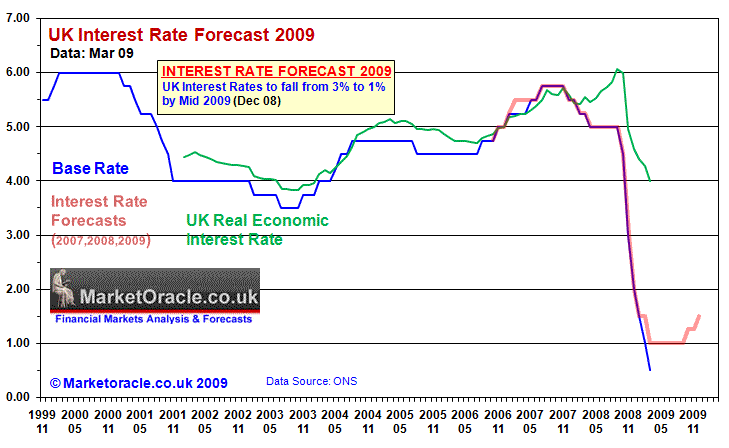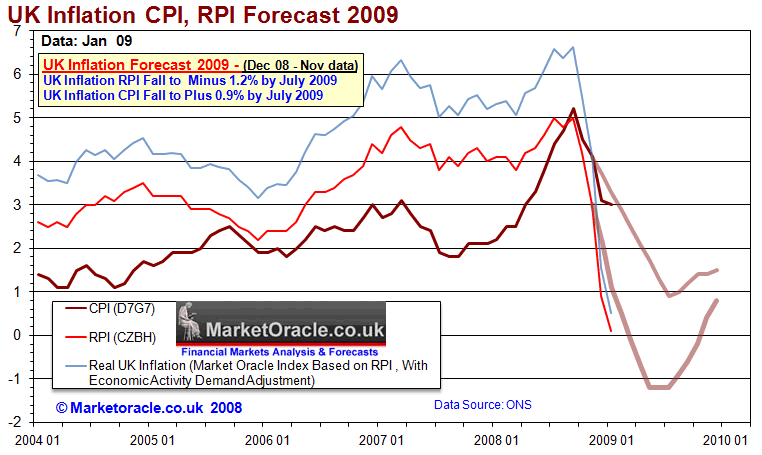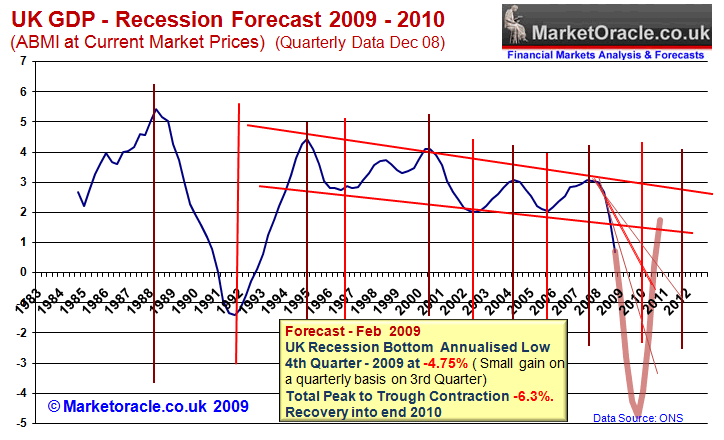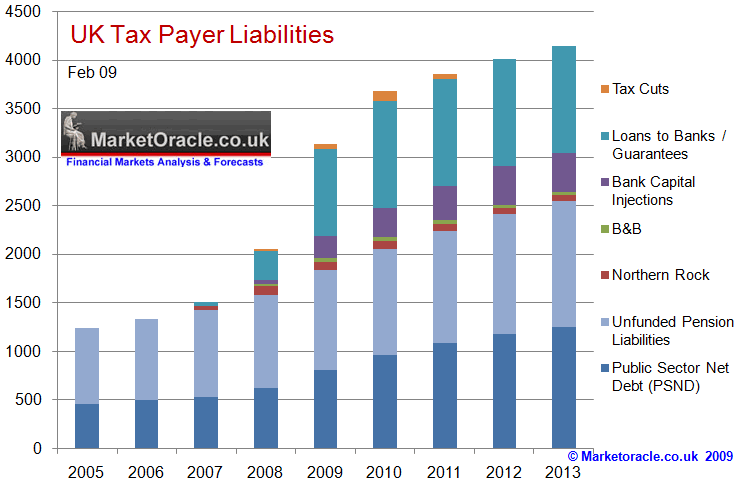Bank of England Ignites Quantitative Inflation
News_Letter / Quantitative Easing Mar 08, 2009 - 09:41 AM GMTBy: NewsLetter
 March 5th , 2009 Issue #18 Vol. 3
March 5th , 2009 Issue #18 Vol. 3
Economic Shock and Awe as Interest Rates are cut to 0.5% coupled with £75 Billion conjured out of thin air by Mervyn King Waving his magic "Central Bank Magic Wand". The government through what should be more accurately termed as "Quantitative Inflation" than "Quantative Easing" sanctioned £75 billion in the initial print run which will have a multiplier effect through fractional reserve banking and leverage of anywhere from between X10 to X20 the amount depending on how it filters through the economy, therefore £75 billion increase in the money supply implies the supply of credit should jump by anywhere between £750 billion to £1.5 trillion, but more probably in the region of X10 at £750 billion over the next few months, with expectations of several more doses of "Quantitative Inflation" during 2009 that seeks to devalue the British Pound towards parity to the U.S. Dollar.
Bank of England Ignites Quantitative InflationDear Reader, Economic Shock and Awe as Interest Rates are cut to 0.5% coupled with £75 Billion conjured out of thin air by Mervyn King Waving his magic "Central Bank Magic Wand". The government through what should be more accurately termed as "Quantitative Inflation" than "Quantative Easing" sanctioned £75 billion in the initial print run which will have a multiplier effect through fractional reserve banking and leverage of anywhere from between X10 to X20 the amount depending on how it filters through the economy, therefore £75 billion increase in the money supply implies the supply of credit should jump by anywhere between £750 billion to £1.5 trillion, but more probably in the region of X10 at £750 billion over the next few months, with expectations of several more doses of "Quantitative Inflation" during 2009 that seeks to devalue the British Pound towards parity to the U.S. Dollar. UK Interest Rates Frankly interest rates being cut from 1% to 0.5% makes little of no positive difference to the economy as the problem is the lack of credit and not the level of the base interest rate, if anything it further reinforces the fact that Monetary Policy has Failed, therefore the government may have been wiser to have left interest rates at 1% which would have sent a stronger message out to financial markets rather than look here. We have panicked again and cut to 0.5% ! 0.25% Next, then what ? The end of monetary policy that's what! I would be surprised if rates were cut again, but with the lack of competent decision making I am afraid it remains a distinct possibility. In terms of the interest rate forecast for 2009, rates are overshooting to the downside towards a target of 0.25% as recent analysis projected towards.
Quantitative Inflation / Printing Money The government and Bank of England talking heads call it a powerful tool to kick start the british economy. However this is in effect the LAST RESORT, something that has not been undertaken during the 300+ years of the Bank of England because it is akin to detonating a nuclear bomb without worrying about the fallout. As mentioned earlier the £75 billion will eventually result in an increase in the amount of credit in the economy of some £750 billion. How does Quantative Easing Work ? The Bank of England will go out in the money markets and firstly buy government bonds to the tune of £100 billion to drive down long interest rates, and secondly buy corporate bonds and therefore create a demand for corporate debt thus driving down corporate bond yields. This allows companies to raise funds and should in theory result in greater investment and hence increase employment and corporate activity. Will it Work ? I cannot see how buying government bonds will work as at the moment demand exists for UK bonds. Buying corporate bonds does increase the demand and hence the supply of corporate bonds will increase which will put cash into the corporate coffers, it all depends on what the corporations do with the cash i.e. do they do what the banks did and bolster their balance sheets or do they spend it ? However printing money does risk igniting inflation as the supply of money goes through the roof. Whilst it has never been tried in Britain before, not even during the last Great Depression. But where it has been tried it has ALWAYS FAILED, as once the printing presses start the governments then find it harder to stop printing and wean the economy off the need for repetitive injections of fresh cash as happened in Germany's Weimar republic that ended in an hyper-inflationary collapse and the most recent example of Zimbabwe which clearly illustrate what eventual outcome of quantitative easing is i.e. total destruction of the currency. Britain is on the SAME PATH which at this point in time suggests much higher inflation as the December inflation forecast concluded (UK CPI Inflation, RPI Deflation Forecast 2009) that deflation will give way to much higher inflation with the most probable outcome of stagflation for a number of years. In my opinion this is a doomsday event for the BRITISH CURRENCY!, Their is much talk that a country cannot function without a banking system, well how is the country going to function without a currency? For the answer to this we just need to look at history where EVERY EXAMPLE OF PRINTING MONEY ENDED IN DISASTER - EVERY TIME ! Those pointing towards Japans experience need to remember that Japan has been in an economic depression since 1990! and its currency has only been maintained due to the large trade surplus which Britain does not enjoy. Fighting Deflation With Inflation. The government and the Bank of England are attempting to fight against the ongoing deflation as a consequence of the collapse of asset values, and the bankrupt financial institutions continuing to deleverage from as high as X60 of capital leveraged positions, which in the process requires the Government to step in and recapitalise the banks and take the toxic debts off the banks balance sheets. My analysis of December 08 concluded that the UK is heading for real deflation during 2009, with the RPI inflation measure expected to go negative by mid 2009 by targeting -1.2%. The trend to date is ahead of expectations however the most recent data showed the CPI measure take a step towards trend by only registering a small drop by falling to 3% from 3.1%
The more money the government prints and the more sterling falls then the greater will be the bounce in inflation during the second half of 2009, i.e. greater than that which was originally forecast (as illustrated above) this will become much clearer by the middle of 2009, but is suggesting that investors need to increasingly gear themselves up towards much higher forward inflation. As I pointed out in the December analysis - The fall in sterling will result in much higher high street consumer prices during 2009 as those retailers that have not gone bust seek to replenish stocks at much higher prices during 2009. This again suggests that the January Sales for Britons may prove to be more illusionary than real as the fall in sterling has already soaked up corporate margins, which again confirms that those UK shoppers seeking to make large purchases are probably better off to do so sooner rather than later. This therefore sends out mixed signals for consumer prices later in 2009. This is now starting to be reflected in food prices as produce is being exported abroad and therefore resulting in less domestic supply, which will soon also be reflected in other goods and services as the price of imports soars and therefore confirms the view of much higher inflation during the second half of 2009. UK Economy Worst Since the Great Depression The analysis of 18th Feb 08 forecast that the UK economy, is heading for its worst recession since the great depression as illustrated by the below graph in that the severe recession is expected to bottom at an annualised rate of -4.75% GDP in the fourth quarter of 2009 (small quarterly gain on the 3rd quarter), which will be followed by a recovery as the rate of annualised GDP contraction improves as government stimulus and Quantative easing measures as well as near zero interests start to impact on the economy. The UK economic recovery is expected to continue into the fourth quarter of 2010 i.e. after the general election. The total recession from peak to trough is expected to see GDP contract by 6.3% and therefore this will be the worst recession since the 1930's Great Depression.
Unfortunately for the Labour government the economic cycle is completely out of sync with the election cycle as the economy is not expected to emerge from this severe recession until AFTER the next election as 2010 1st quarter GDP is estimated to be at an annual rate of contraction of -3.9% (despite a quarterly gain), this therefore increases the probability of Labour losing the next election as the state of the economy is nearly always the primary determining factor for the electorate. However as we witnessed today, the Labour government is doing its utmost to battle against the recession especially as GDP data heads for an headline contraction of more than 4% on annual basis, which means the Labour government is in the process of sacrificing the long-term growth for the short-term possibility of turning the economy around before the 2010 election. This also suggests that the 2010 recovery may not be able to take hold and therefore sets the scene for economic weakness during 2011-2012, suggesting a double dip recession that may be triggered by deep cuts in public sector spending following the next election. Therefore the best outcome at this point from the credit crisis would be for a period of stagflation i.e. low economic growth with high inflation and interest rates. The high inflation will be a necessary evil so as to devalue the value of the record amounts of debt that the government is ratcheting up as illustrated below. The worst case scenario is that of hyperinflation and a collapse of the British currency / economy along the lines of where Iceland is today which has seen a collapse of some 30% in its annual GDP. UK Debt Liabilities Britain's growing liabilities as a consequence of bailing out of the bankrupt banks that already project to 300% of GDP as the below graph illustrates as per the recent analysis - Gordon Brown Bankrupting Britain as Tax Payer Liabilities Soar- Update.
Attempting to save the bankrupt banks has already saddled the tax payer with £1.2 trillion of liabilities and is expected to pass above £2 trillion by the end of 2009. The eventual amount of liabilities may extend to as high as £5 trillion if the whole banking system's liabilities were dumped onto the British tax payer which would trigger far more Quantative Easing as the government instructs the Bank of England to print money to buy government debt due to the increasingly skeptical financial markets which would send the currency spiraling lower and inflation spiraling higher. Punishing the Savers Quantitative Inflation and Zero Interest rates means that Savers are being punished by the government for being responsible instead those that were reckless in borrowing unsustainable amounts of cash are being rewarded. The government is attempting to force savers to a. Spend their savings and consume more as there is little incentive to save at zero interest rates, and b. to Invest their capital into more risky assets such as the stock market and corporate bonds. Which with the stock market trading towards new bear market lows does seem to be working. The Paradox of Cutting Interest Rates towards Zero As mentioned above, the interest rate cut to 0.5% is a mistake which is expected to make little difference to the economy, however it does make a difference to savers who are now even less inclined to put their hard earned cash on deposit with risky banks and hence in effect today's rate cut has the opposite effect to that which was intended as banks are likely to see less cash deposited with them as a consequence of a pittance paid in interest. Additionally, low savings interest rates and threat of banks going bankrupt has apparently triggering a withdrawal of cash from HBOS and RBS to the tune of 10% a piece in favour of the fully nationalised banks of Northern Rock and National Savings. In the UK at present only the first £50,000 of savings is guaranteed at 100%, whilst fully nationalised banks have the full backing of the state and hence a 100% guarantee of all deposits. Small Silver Lining for Savers As mentioned earlier, the eventual outcome of Zero interest rates and Quantative easing will be much higher inflation and interest rates, therefore I do not see low interest rates staying near zero for long i.e. during the second half of 2009 interest rates should start to rise again in tandem with rising inflation. However the loss of value in terms of sterling's depreciation is a far greater cost to savers than a few percent gain on the rate of interest which savers will soon come to realise as the price of goods in the shops soars relative to paltry rates of interest payments. What Will Happen to the British Pound ? Quantitative easing sends a message to the foreign exchange markets that a flood of British Pounds is about to be unleashed onto the market that is outside the normal expected mechanisms of government debt issuance, this in effect insures that the value of all currency in circulation will be devalued and hence investors and speculators act ahead of the curve by continuing to liquidate out of sterling whilst at the same time increasing short positions against sterling i.e. betting on a continuation devaluation in favor of the worlds reserve currency the U.S. Dollar the trend for which is for continuing strength as per the US Dollar Bull Market Forecast for 2009. Conclusion The governments initial print run is for £150 billion in two halves is expected to be followed again by another two runs of £150 billion each as the May 2010 election is still more than 12 months away, which is the primary focus for the Brown Government. This will eventually lead to much higher inflation and interest rates than most expect at this time. Therefore investors and savers need to start to look at gearing themselves towards this development i.e. 1. Falling UK government bond prices as the amount of debt the government issues continues to mushroom. 2. Continuing sterling bear market which targets parity to the U.S. Dollar as a consequence of Quantative easing and government debt. 3. Rising commodity prices as the crackpot policy of Quantative easing is copied around the world which devalues ALL currencies. By Nadeem Walayat Copyright © 2005-09 Marketoracle.co.uk (Market Oracle Ltd). All rights reserved. Nadeem Walayat has over 20 years experience of trading derivatives, portfolio management and analysing the financial markets, including one of few who both anticipated and Beat the 1987 Crash. Nadeem's forward looking analysis specialises on the housing market and interest rates. Nadeem is the Editor of The Market Oracle, a FREE Daily Financial Markets Analysis & Forecasting online publication. We present in-depth analysis from over 250 experienced analysts on a range of views of the probable direction of the financial markets. Thus enabling our readers to arrive at an informed opinion on future market direction. http://www.marketoracle.co.uk Disclaimer: The above is a matter of opinion provided for general information purposes only and is not intended as investment advice. Information and analysis above are derived from sources and utilising methods believed to be reliable, but we cannot accept responsibility for any trading losses you may incur as a result of this analysis. Individuals should consult with their personal financial advisors before engaging in any trading activities. Attention Editors and Publishers! - You have permission to republish THIS article. Republished articles must include attribution to the author and links back to the http://www.marketoracle.co.uk . Please send an email to republish@marketoracle.co.uk, to include a link to the published article.
You're receiving this Email because you've registered with our website. How to Subscribe Click here to register and get our FREE Newsletter Forward a Message to Someone [FORWARD] To update your preferences and access the Newsletter archive [PREFERENCES] How to Unsubscribe - [UNSUBSCRIBE]
|
||||||||||||||
© 2005-2022 http://www.MarketOracle.co.uk - The Market Oracle is a FREE Daily Financial Markets Analysis & Forecasting online publication.







